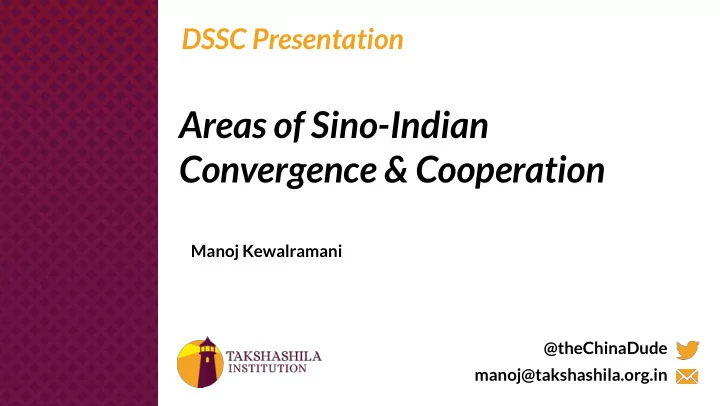

DSSC Presentation Areas of Sino-Indian Convergence & Cooperation Manoj Kewalramani @theChinaDude manoj@takshashila.org.in
● The India-China relationship is entering a new phase post Wuhan ● Three defining features of this phase are: a deepening power asymmetry between the two countries; each’s expanding interests and capacity; and fundamental changes underway in the international order ● While old sources of friction persist, there are now certain new avenues for competition and cooperation ● Competition is a product of historical distrust, expanding interests and divergences over fundamental values; cooperation is likely to be transactional, driven by pragmatic self-interest ● The broader question to ask: Is a stronger, more influential India in China’s interest? The RBF Version
Unfavorable Perceptions
Brookings India: Survey of India’s Strategic Community, 2019.
Brookings India: Survey of India’s Strategic Community, 2019
Brookings India: Survey of India’s Strategic Community, 2019.
Indian Prime Minister Jawaharlal Nehru and Chairman Mao Zedong in Beijing in 1954 Indian Prime Minister Rajiv Gandhi meeting with Deng Xiaoping in Beijing in 1988
➢ Power asymmetry evident in terms of economic, military & human capital development ➢ For both India and China, their interests have grown, and there has been an increase in capacity and willingness to pursue them ➢ Shifts in US policy along with changes in its bilateral relationships with India and China Changing Dynamics
Indian Prime Minister Narendra Modi and Xi Jinping at the informal summit in Wuhan, April 2018. A map depicting claim lines along Doklam plateau, which was the scene of a standoff between India and China in the summer of 2017.
The Topline: A new starting point for the China-India relationship. Differences must not turn into disputes. Recognise and bridge trust deficit. Do this by: Deepening strategic communication; providing strategic guidance to respective militaries; talking about trade; deepening people-to-people engagement Strategic Outlook: ● Bilateral ties viewed in a global perspective; both sides have wider and overlapping regional and global interests ● Both sides follow an independent policy of peaceful development ● Deepen the developmental partnership and push forward bilateral trade and investment in a balanced and sustainable manner ● Respect each other’s concerns and aspirations, i.e., core interests and more Outcomes of Wuhan
● There have been no major incidents along the border; there has been an effort to build on CBMs; bilateral drills have resumed ● Bilateral trade in goods is expanding but remains heavily skewed; this is a structural problem. NTBs exist, but it’s worth noting that China ranks nearly 30 places above India in ease of doing business ● RCEP talks have continued but deep concerns persist among Indian industry vis-a-vis Chinese imports ● India-China Plus, potential for joint projects in third-party countries Since Wuhan
● Effort is underway to deepen people-to-people engagement; this is a top-down exercise, the rewards of which are likely to be limited ● There has been a steady increase of Chinese investments in India; roughly $8 billion over three years; this is a space where organic, market-driven interests are likely to drive cooperation ● Paradiplomacy is one means to expand cooperation on joint developmental challenges, but this remains deeply underdeveloped Since Wuhan
International Stage ● In multilateral fora, interests of both sides converge in areas of global governance reform, broadly from the perspective of sustaining institutions and expanding their respective say in them ● Areas of cooperation include countering terrorism, energy security, climate change and working together in third-party countries ● But there are differences with regard to certain fundamental values and interests ● Cooperation, therefore, is likely to be conditional, issue-based and transactional Transactional Partnership
● Is a stronger, more influential India in China’s interest? ● From a limited economic interests point of view, the Indian market can be valuable ● From a near-term geopolitical perspective, it appears that China desires cooperation ● From a long-term strategic interests point of view, the answer appears to be no Fundamental Question
Thank You. Manoj Kewalramani @theChinaDude manoj@takshashila.org.in
Recommend
More recommend